Published as a serial 1836 – 1837
(Reviewed as part of The Classics Club Challenge)
I didn’t intend to work my way through Dickens’ catalogue but that seems to be what I’m doing. And although I initially included just a couple of his novels on my Classics Club list, I plan to add more, starting with Dickens’ first published novel: The Pickwick Papers.
Unlike many of Dickens’ novels, I had little or no idea what to expect from Pickwick. I began my reading of it because I felt I ought to be more familiar with Dickens’ work. I continued my reading of it because it amused me greatly. I found it delightful, all the more so because it was unexpected.
Originally serialised between March 1836 and November 1837, with Dickens writing under his pseudonym, Boz, it was published in book format that same year and was the first of what would become Dickens’ canon of fifteen novels. At the time of publication, Dickens was just 24 years old.
The Pickwick Papers was originally published with the imposing title of:
The Posthumous Papers of the Pickwick Club, Containing a Faithful Record of the Perambulations, Perils, Travels, Adventures and Sporting Transactions of the Corresponding Members.
I’m pleased it’s been shortened, although the original epithet does provide an accurate representation of what the book is about.
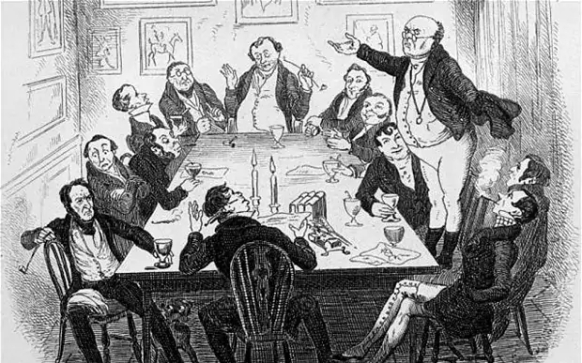
Reminiscent of earlier picaresque novels such as Don Quixote, the story is tenuous and episodic. Samuel Pickwick is perpetual president of the club that bears his name and it is proposed that he and three fellow members of the club venture out of London and report back to their fellows on their experiences. What follows is a saga of their misadventures, most of which are absurd and/or amusing.
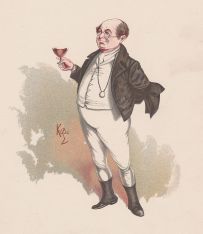 Pickwick himself is a lovable character; I warmed to him very quickly. He may appear pompous and frequently foolish, but he’s an innocent: a man who thinks well of everyone whenever he can. He is generous, benevolent and genuinely tries to do what he believes is best for his friends and acquaintances.
Pickwick himself is a lovable character; I warmed to him very quickly. He may appear pompous and frequently foolish, but he’s an innocent: a man who thinks well of everyone whenever he can. He is generous, benevolent and genuinely tries to do what he believes is best for his friends and acquaintances.
His three companions: Tracy Tupman, Augustus Snodgrass and Nathaniel Winkle pale in comparison to the glorious Pickwick but are essential players in the catalogue of adventures and misadventures that make up the book.
It is the introduction of Sam Weller however, in chapter 10, which caused sales to soar. Sam is introduced as an affable cockney who can turn his hand to most things. Mr Pickwick engages him as a servant. His loyalty is unswerving and by the end of the book he is Pickwick’s close friend. Sam is shrewd and knowing; experienced in the world. He contrasts perfectly with Pickwick’s innocent bumbling.
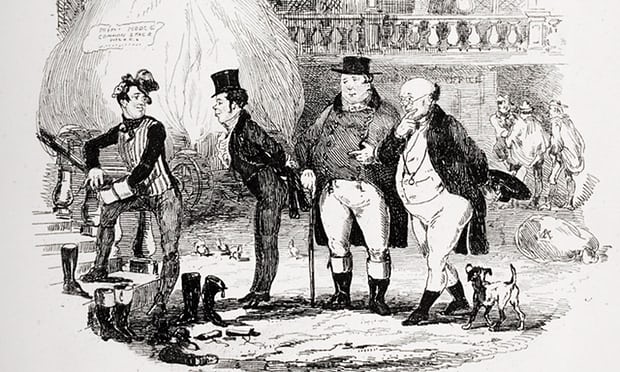
There is also Mr Jingle, whom we meet almost as soon as the intrepid travellers set off. Mr Jingle was my first real introduction to the vast array of characters that Dickens will create over his career. I’ve encountered others of course, but without fully appreciating Dickens’ craft and creativity. Dickens gives a vivid physical description of Mr Jingle when he first appears but it’s his remarkable manner of speaking which really makes him jump off the page.
“Heads, heads – take care of your heads”, cried the loquacious stranger as they came out under the low archway which in those days formed the entrance to the coachyard. “Terrible place – dangerous work – other day – five children – mother – tall lady, eating sandwiches – forgot the arch – crash – knock – children look round – mother’s head off – sandwich in her hand – no mouth to put it in – head of family off – shocking, shocking. Looking at Whitehall Sir, – fine place – little window – somebody else’s head off there, eh, Sir? – he didn’t keep a sharp look-out either – eh, sir, eh?”
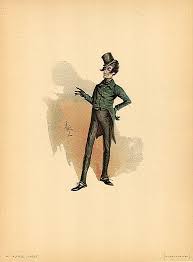 Jingle is a trickster, a con-man, albeit frequently a loveable one. He and Pickwick cross paths regularly as their adventures unfold, each at times gaining the upper hand. Ultimately, it is Pickwick who supports Jingle through a very difficult predicament and generously sets him on his feet again.
Jingle is a trickster, a con-man, albeit frequently a loveable one. He and Pickwick cross paths regularly as their adventures unfold, each at times gaining the upper hand. Ultimately, it is Pickwick who supports Jingle through a very difficult predicament and generously sets him on his feet again.
Jingle is just one of the cast of characters that I enjoyed. Even those playing very minor roles such as the sleepy fat boy, Joe, are memorable. I found Sam Weller’s father, Tony, very endearing for all his faults, and Mr Wardle of Dingley Dell gives us a foretaste of books to come when he invites the Pickwickians to spend Christmas with his family.
As well as vivid and engaging characters, Dickens paints comical and jocular scenes. Our heroes narrowly escape injury whilst observing the armed forces on manoeuvres. Having escaped the cannon fire, poor Mr Pickwick’s misfortunes continue apace:
There are very few moments in a man’s existence when he experiences so much ludicrous distress, or meets with so little charitable commiseration, as when he is in pursuit of his own hat. A vast deal of coolness, and a peculiar degree of judgment, are requisite in catching a hat. A man must not be precipitate, or he runs over it; he must not rush into the opposite extreme, or he loses it altogether. The best way is to keep gently up with the object of pursuit, to be wary and cautious, to watch your opportunity well, get gradually before it, then make a rapid dive, seize it by the crown, and stick it firmly on your head; smiling pleasantly all the time, as if you thought it as good a joke as anybody else.
There was a fine gentle wind, and Mr. Pickwick’s hat rolled sportively before it. The wind puffed, and Mr. Pickwick puffed, and the hat rolled over and over as merrily as a lively porpoise in a strong tide…
Later in the book, the Pickwickians embark on a shoot – with some misgivings considering that none of them are serious sportsmen. Mr Pickwick is temporarily lame, but very much wishing to accompany them he agrees to being pushed along by Sam in a wheelbarrow. What follows (chapter 19) had me laughing aloud.
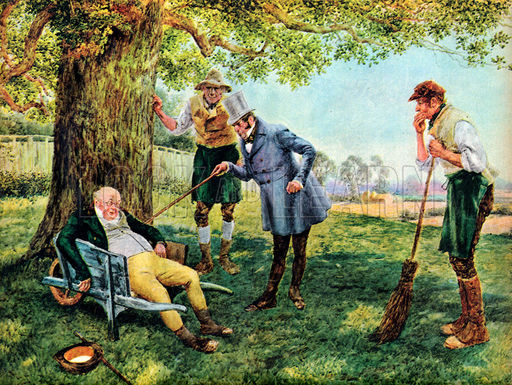
There is of course, light and shade in the book. Not every scene is witty and whimsical, and there are some dark chapters in Fleet Prison. There are also peaks and troughs in the writing and plotting. Occasional chapters and sections of the book dragged, and the already tenuous tale meanders off in unwarranted directions more often than I would have wished. (Cannily adding another episode or two to the serialisation no doubt.) But always the pace quickens again. The dialogue remains bright and original: the whole book is enlivened by Dickens’ ability to bring his characters to life through their own words.
Dickens must have had enormous fun putting these vignettes together. Even at this early stage in his career, his sense of the theatrical is very evident. The book is brimming with life: overflowing with ebullience, innocence and warmth. I wish I had first come to it several decades ago. That would have given me more opportunities to read it again, and were I to do so, I know I’d find it just as funny and discover much that I missed first time around.
The spirit of The Pickwick Papers was replicated in many clubs and societies that were formed in the wake of the book, with Dickens’ endorsement. In Little Women, by Louisa May Alcott, published in 1868, the March sisters have their own Pickwick Club and take on the names of Dickens’ club members. The word Pickwickian stands in its own right, and a medical condition is known as Pickwickian Syndrome, drawing on Mr Pickwick’s well-known portly bearing. With his first published novel, Dickens introduces a storyline and most specifically, characters, that remain alive in our minds today regardless of whether we’ve read the book.
Reading a little more about Dickens in the course of putting together my thoughts on Pickwick, I learned of the controversy that surrounded its birthing. I learned more of the young man whose name was to be made by its publication. I already had some background of Dickens the writer and Dickens the man, but this controversy was new to me. I’m left wanting to know more. I still plan to read his books (including a re-read of the dreaded Hard Times, which was my first serious introduction to Dickens and put me off reading anything beyond A Christmas Carol for a very long time). But more than ever, I want to read more about Dickens himself.
I’m thinking about:
Charles Dickens: a life by Claire Tomalin, which seems to be the current definitive book on Dickens
Dickens: abridged by Peter Ackroyd, perhaps superseded by Tomalin’s work, but maybe worth a look via the library
Charles Dickens by Simon Callow, because I love Simon Callow, who seems to me in many respects to be Dickens personified
Death and Mr Pickwick by Stephen Jarvis, a novel which focuses on the controversy surrounding the origins of Pickwick
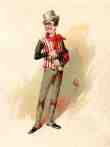









My limited experience of reading of Dickens is something I normally keep to myself, but you have inspired me to come clean! Like you, I ploughed through Hard Times many years ago for a university course, and later embraced A Christmas Carol, but that’s it. I once attended a lecture by Claire Tomalin when she published her biography and it has always been a book I have intended to read…at some point… And just recently, I used one of my monthly audible credits to select a new recording of Simon Callow reading A Tale of Two Cities. I suspect that Dickens might be a bit more accessible this way – it will be interesting to see. And I look forward to hearing more about your Dickens adventures in future posts! 🙂
LikeLiked by 1 person
I’m glad it’s not just me, Liz! Simon Callow feels synonymous with Dickens to me. I’d love to see one of his shows, and indeed listen to one of his recordings. A Tale of Two Cities may be a while away for me if I do choose to carry on reading in roughly chronological order. But maybe I’ll find myself wanting to break out of that constraint at some stage!
LikeLiked by 1 person
I should think he would be magnificent in person. We once saw Sir Patrick Stewart give a one-man performance of A Christmas Carol which was absolutely stunning. I’m sure it will be fascinating to stick (roughly) to the chronology so that you can track Dickens’ development as a writer. Probably good for self-discipline too, rather than picking and choosing your ‘favourites’! 🙂
LikeLiked by 1 person
I’m hoping it will be good for my self-discipline, Liz. It could certainly do with a boost! One day I hope to see a production like the one you’ve described. It is one of the drawbacks of living down here: we’re so far from anything when it comes to shows, exhibitions etc. But I can’t have everything 🙂
LikeLike
One dreary New England winter I read “Bleak House” for a course on the 19th century British novel.(Why I took that course is a good question. A very very long novel every week.) Anyway, I never forgot the endless court case and had a similar experience with my siblings over my mother’s will. I even started joking with the executor about the similarity of fact and fiction.
LikeLiked by 1 person
When fiction and life coincide over something of significance, it seems doubly intense. Bleak House is not a novel I’m looking forward to, I must admit. Even the name is dreary! But I’ve been pleasantly surprised by what I’ve read so far of Dickens so perhaps BH will be another happy discovery!
LikeLiked by 1 person
Well, I wouldn’t rush into it!
LikeLiked by 1 person
I have also been working through Dickens’ novels over the last few years and still have about half of them left to read. This is the one which has always seemed least appealing to me, so I’m glad to see such a positive review from you! I can recommend the Claire Tomalin book, although I haven’t read any other Dickens biographies. Death and Mr Pickwick sounds interesting!
LikeLiked by 1 person
I do recommend it, Helen. Dickens was young, obviously, and although there is evidence of his social awareness it’s less apparent in this book than in others. Mostly to be read with a smile 🙂
LikeLike
J > Alas, i’m probably not alone in subconsciously treating Pickwick Papers as having a place in the Dickins pantheon of books. I’ve read everything else, at least once, but not the Papers – not even seen them (it?) on-screen (has there a been a production). Perhaps now I … But I don’t have a copy on the bookshelf!
LikeLiked by 1 person
I think there have been several films made, not that I’ve seen any. I certainly enjoyed it. What fascinated me most though, was the circumstances surrounding the publication: an insight into the young Dickens’ ambition and force of character perhaps. I shall plod on through his works – into the books that you have read, Jonathan!
LikeLike
An excellent advocacy
LikeLiked by 1 person
The Pickwick Papers is one of several Dickens novels that I’ve never attempted. I can highly recommend Tomalin’s biography. Death and Mr Pickwick is very clever, but quite the slog. We saw Simon Callow in a wonderful one-man show called The Mystery of Charles Dickens some years back. I can see why you associate him with Dickens.
LikeLiked by 1 person
Rebecca, thank you for the helpful insights. I shall certainly get Tomalin’s biography. I’m intrigued by Death and Mr P – not so sure I’m intrigued enough to slog through it though. Having just discovered it available to reserve at the library – and realised it’s a real doorstopper I begin to see why it’s a slog. I’ve reserved it though and shall at least take a peek. Thanks again 🙂
LikeLike
I’ve been rather lazy about Dickens. The discursive nature of the telling, so suited to the way many of his tales were originally issued puts me off rather. But your review is so positive I know I’ve been missing out. He’s back on the list. Thank you.
LikeLiked by 1 person
Margaret, you may not be thanking me if you do tackle him and are reminded of why you’ve been put off for so long!
You’re right about the discursive nature of his writing. I find I have to accept that a Dickens book will take me a long time. I read it in small chunks – the chapters are generally very convenient lengths. (Another benefit of the way the works were originally issued.) Since I like to have several books on the go at the same time, this works very well for me. I enjoy taking the time over each chapter, savouring as I go. If I was a ‘one-book-at-a-time person’ I couldn’t cope with him, I’m quite sure of that! Diluted among other books, he’s very palatable!
LikeLiked by 1 person
That’s good advice. I am a one-book-at-a-time sort of person. But I’ve just got some short stories out of the library, so this might be a good moment to have three things on the go at once, Pickwick among them.
LikeLiked by 1 person
A refresher nice and pleasant like the breeze in Spring. I plan to read (and reread some of them) all of the Dickens’ novels in my retired life. I am looking forward to reading more of your reviews that will appear here.
LikeLiked by 1 person
I have not read any Dickens for years and have not read The Pickwick Papers. Oddly, though Bleak House stands out in my memory, largely because Dickens’ heartfelt outrage at the injustices of the legal system animates what might otherwise be a tad long winded, and also some of the foibles of some of the characters are just so true to life (if not larger than life) 🙂 Perhaps its time for me to read some Dickens again – I have always had a soft spot for the English 19th-century novel. But, I struggle to keep up even with the many blog posts I want to read!!
LikeLiked by 1 person
I know what you mean, Carol. We are deluged with fascinating reading material (and even more that is less fascinating). Some things have to give!
LikeLiked by 1 person
Hi – I tried leaving a comment a few days ago, but there was a crash when I posted, and it looks like the post didn’t get to you. So let me try again!
I am the author of the novel Death and Mr Pickwick, which is mentioned above, and which tells the story behind the creation of The Pickwick Papers. In my view, The Pickwick Papers is not only a great book, it also has the greatest backstory of any work of fiction. I sometimes say that the backstory cried out out to be turned into a novel itself…so that’s what I did! And no previous knowledge of Dickens or The Pickwick Papers is required before reading Death and Mr Pickwick.
Opinions about any book vary of course, but I can’t just let the description of Death and Mr Pickwick as ‘a slog’ stand unchallenged. You might for instance take a look at the Independent’s review, which described Death and Mr Pickwick as “thrilling”. Here is the link to that: http://www.independent.co.uk/arts-entertainment/books/reviews/death-and-mr-pickwick-by-stephen-jarvis-book-review-thrilling-search-for-mr-pickwick-and-those-who-10256163.html The novel indeed made the Oprah Winfrey ‘Best of Summer Fiction’ list and the Sunday Times Book of the Year list. Here is the Sunday Times review, which I posted on the Death and Mr Pickwick facebook page: https://www.facebook.com/deathandmrpickwick/posts/675813069219215 Several prominent people indeed named Death and Mr Pickwick as their personal book of the year, including Dr Rowan Williams, the former Archbishop of Canterbury.
Sorry if that sounds like trumpet-blowing. It isn’t meant to be. Above all, I hope that after reading Death and Mr Pickwick, people will be drawn towards The Pickwick Papers, which these days is sadly neglected among Dickens’s novels.
All the best
Stephen Jarvis
LikeLiked by 1 person
Hello Stephen, thank you for getting in touch and for the links and additional information you’ve provided. It will please you to know that a copy of Death and Mr Pickwick is already waiting for me when I get home next week. (I’m away at the moment.) With so many books waiting to be read, I might use the word ‘slog’ in reference to any book beyond 500 pages, but I appreciate you taking the time to redress the balance and I shall approach the novel with your points, and the reviews you’ve pointed me towards,well and truly in mind. I knew nothing about the backstory behind Pickwick until I started reading in order to write my thoughts of The Pickwick Papers, and I agree, it’s certainly fascinating. Perhaps in time, I’ll find myself posting my thoughts on Death and Mr Pickwick, which will be based on the experience of reading the book properly, rather than on the somewhat daunting prospect of its length!
Thanks again,
Sandra
LikeLike
Hi Sandra – Many thanks for your reply, and I am delighted that you have a copy of Death and Mr Pickwick waiting for you! The length of Death and Mr Pickwick was deliberate – it is the same length as The Pickwick Papers. This is one of various ways in which Death and Mr Pickwick parallels The Pickwick Papers. Another parallel is the use of inset stories. Also, my favourite quote about The Pickwick Papers is “Pickwick is not a novel but a universe”, which the Canon of Westminster Abbey made in a statement in 1936, during centenary celebrations for Pickwick. I know exactly what the Canon meant – Pickwick has a ‘vastness’ and there is definitely something universe-like about it. I wanted the same quality for Death and Mr Pickwick, and this is another reason why my novel is the length it is. I would also recommend taking a look at this review of Death and Mr Pickwick in The Atlantic magazine: https://www.theatlantic.com/magazine/archive/2015/06/was-dickens-a-thief/392072/ Indeed, the response to my novel has been overwhelmingly positive, the main negative response coming from the New York Times, whose reviewer hated it, but I guess you can’t please everyone! Finally, I would urge people to take a look at the Death and Mr Pickwick facebook page http://www.facebook.com/deathandmrpickwick There have now been hundreds of posts on the page, by myself and others, on all aspects of The Pickwick Papers and Death and Mr Pickwick. One of my fans even said that probably no other novel has such a facebook presence as Death and Mr Pickwick, and I think he could well be right!
All the best
Stephen
LikeLiked by 1 person
Hi Stephen, Just an acknowledgement as time is short for a few days. I shall certainly read the Atlantic review and check out the facebook page. And of course – the novel!
LikeLiked by 1 person
You’ve inspired me to give The Pickwick Papers a whirl, Sandra. I’ve read half a dozen books by Dickens over the years, but there are some that I’ve never felt compelled to read – Pickwick, Bleak House and Hard Times among them. There is one that I need to try again – The Old Curiosity Shop. I first read it when I was very young, around ten or eleven years old, and I didn’t like it. I loved A Christmas Carol, though, and when I read Great Expectations at school, that cemented Dickens as a favourite writer, leading me on to Dombey & Son, Little Dorrit, and Oliver Twist. A Tale of Two Cities is next on my Dickens list.
LikeLiked by 1 person
My first introduction to Dickens was on an OU foundation course where we were required to read Hard Times. How I hated it! A Christmas Carol I loved even then but it’s so ingrained into our psyches that I almost don’t think of it as part of Dickens’ catalogue. Only in recent years have I finally come to appreciate his work and although I’m not being that strict, I’m generally reading through in chronological order.
Pickwick was a delight – in part because I had no idea what to expect. And the back story is fascinating . I plan to read Death and Mr Pickwick soon (see exchanges in this comments thread) – a small detour from the slow and steady ongoing Dickens read. (I see I didn’t reply to Stephen Jarvis. I will though, when I’ve read his book even if that will be quite a lot later this year.)
I enjoyed Oliver Twist and I jumped ahead and read Great Expectations though knowing the stories beforehand obviously impacted. And I loved Nicholas Nickleby – much to my surprise. The Old Curiosity Shop left me cold (and bored) – again, not at all how I expected to react. I’m currently reading Barnaby Rudge which I knew nothing about and I’m thoroughly enjoying it. It’s regarded as the least known of his novels but definitely worth reading in my view. Whatever his faults – and which of us are perfect – Dickens is a glorious story-teller!
I hope you enjoy Pickwick, Jan. I’m so tempted by A Tale of Two Cities now; I heard so much about how good it is. But I shall try to plod through as I have been because I’m enjoying noticing Dickens’ development as a writer. I’ll look forward to hearing your thoughts when you’ve read it.
(This reply is almost as long as one of Dickens’ books! 😉
LikeLike
Nicholas Nickleby is my best friend’s favourite book by Dickens. I’m seeing her later this month and will ask if I can borrow her copy. Thanks for the reminder!
LikeLiked by 1 person
This one is on my book wish list. I still have a few more Dickens on my shelf to read so maybe after I read a few more I’ll treat myself to this one (I have Oliver Twist, Bleak House, Our Mutual Friend, Little Dorrit and Nicholas Nickleby). I plan to reread Great Expectations because I don’t remember it from when I read it in school.
LikeLiked by 1 person
I’ve just finished Barnaby Rudge; I’m vaguely working through them in order. (And so very behind on including them on the blog!) It means that next up is Martin Chuzzlewit which isn’t filling me with enthusiasm. There again, I felt the same about Barnaby Rudge before starting it and I really did enjoy it, so hopefully the same will happen. Whatever else may be said about Dickens, he is a consummate story-teller. Pickwick is a merry book above all else; just plain good fun!
LikeLiked by 1 person